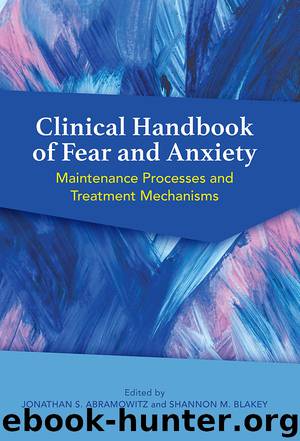Clinical Handbook of Fear and Anxiety by Unknown

Author:Unknown
Language: eng
Format: epub
Publisher: American Psychological Association
AUTOBIOGRAPHICAL MEMORY INCLUDES EPISODIC AND SEMANTIC COMPONENTS
Episodic and semantic components of autobiographical memory represent two pathways to self-knowledge, each of which may contribute to the maintenance of clinical fear and anxiety. The process of episodic recollection encompasses an experiential component termed autonoetic consciousness, which involves an awareness that the particular event is unique to that individualʼs past experience (Tulving, 1985). As such, episodic memories of specific salient past events provide a way for people to exist beyond the present moment, allowing them to perform various self-projections and engage in “mental time travel” from recollected past to imagined future events (Schacter et al., 2012). Episodic memories also provide a template for the simulation of personal goal-directed scenarios and problem-solving in the context of novel situations (M. Moscovitch, 2012).
In individuals with anxiety, negative or traumatic personal events appear to be recalled and retrieved (voluntarily or involuntarily) in particularly rich and vivid episodic detail (e.g., D. A. Moscovitch et al., 2018). Access to rich autobiographical details related to anxiety can contribute to biased self-projections or evoke biased solutions to current and future problems. Specific autobiographical memories can contribute to anxiety by providing exemplar templates of fear, which are drawn upon and influence how an individual responds in anticipation of or during anxiety-provoking situations.
Most episodic memories are transformed and assimilated over time into higher-order autobiographical representations, so that they become more schematic and semantic, encapsulating the central gist of the event or experience rather than a rich episodic memory representation per se (M. Moscovitch, 2012). Given that semantic memories do not depend on the ability to retrieve episodic memories of the events that led to the creation of particular schemas or self-beliefs, the use of semantic information can provide a quick route to schema-based cognitions and behaviors. In anxiety disorders, relying on negative schematic information represented in semantic memory can maintain maladaptive core beliefs, which contribute to the inability to access more adaptive, alternative modes of thinking and behaving (Beck, Emery, & Greenberg, 2005; D. A. Clark & Beck, 2010). Semantic memory also provides a frame through which people retrieve, assemble, and interpret relevant episodic details from memory (DʼArgembeau, 2012). For example, Dev has an image of himself blushing, drawn from a specific episode, which over time has come to represented an amalgamation of blushing experiences, providing him with semantic knowledge of the negative self-relevant consequences of attending anxiety-provoking situations (i.e., he will blush and people will believe he is incompetent).
Download
This site does not store any files on its server. We only index and link to content provided by other sites. Please contact the content providers to delete copyright contents if any and email us, we'll remove relevant links or contents immediately.
Should I Stay or Should I Go? by Ramani Durvasula(7667)
Why We Sleep: Unlocking the Power of Sleep and Dreams by Matthew Walker(6722)
Fear by Osho(4736)
Flow by Mihaly Csikszentmihalyi(4697)
Rising Strong by Brene Brown(4459)
Why We Sleep by Matthew Walker(4443)
The Hacking of the American Mind by Robert H. Lustig(4381)
How to Change Your Mind by Michael Pollan(4356)
Too Much and Not the Mood by Durga Chew-Bose(4347)
Lost Connections by Johann Hari(4184)
He's Just Not That Into You by Greg Behrendt & Liz Tuccillo(3900)
Evolve Your Brain by Joe Dispenza(3678)
The Courage to Be Disliked by Ichiro Kishimi & Fumitake Koga(3503)
Crazy Is My Superpower by A.J. Mendez Brooks(3400)
In Cold Blood by Truman Capote(3384)
Resisting Happiness by Matthew Kelly(3340)
What If This Were Enough? by Heather Havrilesky(3311)
The Book of Human Emotions by Tiffany Watt Smith(3309)
Descartes' Error by Antonio Damasio(3277)
